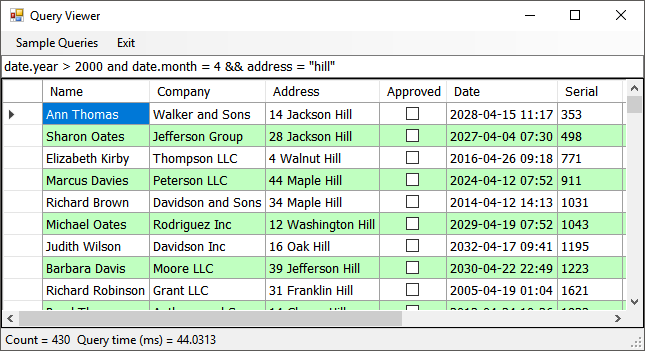Introduction
I have been using RaptorDB in production for a long time, and recently as a what if, I asked if I could do away with using a database engine for a project, but still have the same functionality. This idea came about with RealNews which uses no database at all and works great even with a lot of feed items.
With what I will explain below, I was able to add this feature to my app and via a configuration setting, seamlessly switch between RaptorDB and dynamic LINQ to objects with the functionality of sorting and paging staying the same for the user.
Obviously, this is not a solution for every case, and makes sense if your data is limited in size and can fit in memory.
Some uses include:
- caching data within an app for fast no round trip access
- small/medium data sized zero install apps
- user defined query capabilities behind a web API
What is Needed
Say you have a list of objects:
var list = new List<SalesInvoice>();
in code you can already do a lot with LINQ like:
var results = list.FindAll(x => x.Serial<100);
which works great at compile time, but what if the filter is a dynamic string you get from the user in a browser and your code is on the server behind an API.
Enter System.LINQ.Dynamic which is a bit of code from Microsoft which allows you to use strings in the Where() function.
With this, now you can do:
var result = list.Where("name.Contains(\"Peter\") and serial<100");
which is awesome, but I really like to write SQL like queries and not C# specific ones:
var result = list.Where("name = \"Peter\" and serial<100");
so tinkering in the System.LINQ.Dynamic is needed which is not for the faint hearted.
How It Works
Now System.LINQ.Dynamic is a complex thing and not easy to wrap your head around, but by debugging, I was able to find the place where the equality checking happens, and insert the code needed.
The code checks the left hand side of an equal for a string type and then builds an Expression to handle the Contains() checking of the right hand side.
Also to allow searching Guid types, it first uses ToString() then uses Contains() so you can search Guid like strings.
The Problem with Contains()
First, I used Contains() but quickly found out that it is case sensitive which is not what a user expects, so I had to write a case insensitive version with IndexOf(), essentially the following C# code in Expression syntax:
var bool = str.IndexOf("val", StringComparison.OrdinalIgnoreCase) >= 0 ;
The Code
Below is the code added and changed in Dynamic.cs in System.LINQ.Dynamic. The throw exception case I commented happened for some reason, but skipping it works fine.
void CheckAndPromoteOperands(Type signatures, string opName,
ref Expression left, ref Expression right, int errorPos)
{
Expression[] args = new Expression[] { left, right };
MethodBase method;
if (FindMethod(signatures, "F", false, args, out method) != 1)
;
left = args[0];
right = args[1];
}
Expression Contains(Expression left, Expression right)
{
Expression[] args = new Expression[] {
right, Expression.Constant(StringComparison.OrdinalIgnoreCase) };
if (_indexof == null)
{
FindMethod(typeof(string), "IndexOf", false, args, out MethodBase mb);
_indexof = mb;
}
Expression ex = Expression.Call(left, (MethodInfo)_indexof, args);
return Expression.GreaterThanOrEqual(ex, Expression.Constant(0));
}
Expression NotContains(Expression left, Expression right)
{
Expression[] args = new Expression[] { right, Expression.Constant
(StringComparison.OrdinalIgnoreCase) };
if (_indexof == null)
{
FindMethod(typeof(string), "IndexOf", false, args, out MethodBase mb);
_indexof = mb;
}
Expression ex = Expression.Call(left, (MethodInfo)_indexof, args);
return Expression.LessThan(ex, Expression.Constant(0));
}
Expression GenerateEqual(Expression left, Expression right)
{
if(left.Type == typeof(Guid))
{
FindMethod(typeof(Guid), "ToString", false, new Expression[] { }, out MethodBase ts);
Expression tse = Expression.Call(left, (MethodInfo)ts, null);
return Contains(tse, right);
}
if (left.Type == typeof(string))
return Contains(left, right);
else
return Expression.Equal(left, right);
}
Expression GenerateNotEqual(Expression left, Expression right)
{
if (left.Type == typeof(Guid))
{
FindMethod(typeof(Guid), "ToString", false, new Expression[] { }, out MethodBase ts);
Expression tse = Expression.Call(left, (MethodInfo)ts, null);
return NotContains(tse, right);
}
if (left.Type == typeof(string))
return NotContains(left, right);
else
return Expression.NotEqual(left, right);
}
Cool Features
LINQ allows you to page data:
list.Where("serial<100").Skip(100).Take(10);
and it also allows you to sort data:
list.Where("serial<100").Orderby("name");
list.Where("serial<100").Orderby("name desc");
as you can see, the property names are not case sensitive, which makes using it a joy.
Also, you can use:
- SQL like
and or - c# style
&& || - not equal
!= <> - parenthesis
- properties in properties with dots
(name = "peter" && address = "hill") or (serial<100 and date.year=2000)
name != "peter" and address <> "hill"
The Sample App

To show the features, I created a sample app that generates 100,000 SalesInvoice objects with Faker.dll and allows you to query and show the results in a grid.
You can choose sample queries from the menu and tweak and change it with the text box. To run the query, just press enter while typing.
Other Possible Features
Appendix - Update 1
A problem I encountered was if you had null values in the properties you are querying for then the LINQ will just crash, to overcome this I changed the Contains() and NotContains() functions to check for this:
Expression NotContains(Expression left, Expression right)
{
Expression[] args = new Expression[] { right, Expression.Constant(StringComparison.OrdinalIgnoreCase) };
if (_indexof == null)
{
FindMethod(typeof(string), "IndexOf", false, args, out MethodBase mb);
_indexof = mb;
}
Expression nn = Expression.Equal(Expression.Constant(null), left);
Expression ex = Expression.Call(left, (MethodInfo)_indexof, args);
return Expression.OrElse(nn, Expression.LessThan(ex, Expression.Constant(0)));
}
Expression Contains(Expression left, Expression right)
{
Expression[] args = new Expression[] { right, Expression.Constant(StringComparison.OrdinalIgnoreCase) };
if (_indexof == null)
{
FindMethod(typeof(string), "IndexOf", false, args, out MethodBase mb);
_indexof = mb;
}
Expression nn = Expression.NotEqual(Expression.Constant(null), left);
Expression ex = Expression.Call(left, (MethodInfo)_indexof, args);
return Expression.AndAlso(nn, Expression.GreaterThanOrEqual(ex, Expression.Constant(0)));
}
Previous Releases
History
- Initial release : 3rd January, 2020
- Update 1 : 11th January 2020
